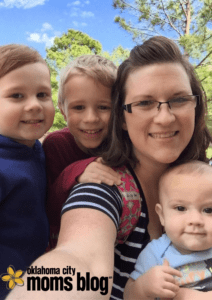
Even if you do not experience depression yourself, you most likely know someone who does. Oklahoma has one of the highest rates of mental illness in the country, with depression being one of the most common forms. This is a particularly important topic for women, moms, and those who love them (so, everyone). We have come a long way in how we handle mental illness, but there are still some misconceptions out there about what depression actually is and how it affects people. Understanding the realities associated with depression can empower us to support and love our friends, family, coworkers, and others around us in a very impactful way. Here are a few things that might prompt you to see things from a different perspective.
1. Depression is more than just “being sad.”
Depression is a complicated disorder. I’m not just wallowing in self-pity. I’m really struggling with life in general on all fronts. It can be really disheartening to get feedback that minimizes what you are going through. It helps if friends and family can learn a little bit about what depression really is. Depression symptoms tend to be long-term and can affect the body and mind in many ways: sad/anxious mood, sleeping and eating abnormalities, decreased energy, struggles with memory and concentration, and more. Not everyone experiences depression the same way. Some people may experience many negative symptoms associated with their depression, while others only experience a few. The intensity of these symptoms may vary from person to person. We have good days and bad days. They just may look a little different than yours. We are normal people who just happen to have this particular challenge.
2. There is no universal “magic cure.”
Please don’t tell me that special shakes, exercise, or essential oils will make my problems float away (especially if you are selling them for profit–that’s a slap in the face). While these things may help, most people need a combination of several treatments, lifestyle modifications, and support systems unique to their individual needs. Every person is different. Just because something helped someone you know, doesn’t necessarily mean that it is going to work for me. It may take a period of trial and error to find out what works. And even when I do find something that works, improvement is generally slow and gradual. So please be patient with me in the meantime.
3. Antidepressants aren’t “the easy way out.”
I’ll never understand comments that some people make to the effect of, “People just need to stop popping pills and just snap out of it.” Um, it doesn’t work that way. I wish I could snap out of it. I don’t want to feel like this. I want to be normal! If I could, I would! This disorder prevents me from helping myself because the part of my body that is sick (the brain) is the same part of the body that controls decision making and everything else in my body.
The decision of whether or not to take medication is one that most people take very, very seriously. It was extremely difficult for me to even admit to myself that I might need a medication to help me, after all my other efforts were proving worthless. The first time I spoke to my doctor about my symptoms and inquired about medication, she explained it to me like this: “Antidepressants are like a life preserver to someone who is drowning in the ocean during a storm. Once you have the life preserver, the storm is still raging. But you aren’t drowning, and you’re able to hang on.” Medications don’t make you instantly “happy.” Rather, they are a tool to help your brain help itself. There is still a lot of work involved in overcoming the obstacles of depression.
4. We aren’t lazy
Living with depression means that your energy is limited. Things that seem easy to most people can take a noticeable toll on a person with depression or anyone with limited energy. I use all the energy that I have every day; but some days what I have to give is much less than others. Being lazy means you are unwilling to use energy; being depressed means (at times) you are unable to. The spoon theory explains through metaphor what it is like to live with limited energy. Energy is represented by spoons. Every task throughout your day “costs” some number of spoons. When your spoons run out, you cannot get more until the next day. Your body is done. You cannot do more. If you push yourself beyond that point, you will pay for it the next day. You will have even fewer spoons to work with than the day before. Rest and sleep are necessary to recharge.
There are times where I have desperately wanted to do more than I knew I could. Frustration can reach an all time high in these moments. Try to give me the benefit of the doubt if I appeared to be having a fantastic girls’ night out one day and the next I’m cancelling our play date. It’s nothing personal against you; I can’t always anticipate it, and I feel badly about it.

5. We don’t always know what we need.
It’s hard to ask for help. It can seem like a superhuman feat to do so. But even when a friend reaches out to me to offer help, I sometimes don’t know what to say in response to, “What can I do?” Because the truth is, I don’t always know, or I don’t know how to explain what I’m feeling. I’ve thought a lot about this question and what I wish I could say sometimes if I could, 1) Remember this in the moment, and 2) Be brave enough to actually say it. The thing is…mainly I just want a friend–a real friend. I want someone I can talk to and who will listen without judgement. Sometimes that may take some prodding. First, I want to know that you’re not going to freak out and run away when I share stuff. I want to be really sure that the conversation will be a safe one. I wish that my friends knew that I want them to keep asking me how I’m doing in a very direct way. I want them to keep inviting me to stuff even when I’m super flaky. I want to laugh with them and enjoy their company.
My advice to anyone who has a friend or family member who is dealing with depression is to never stop reaching out. It may take some effort to maintain the relationship, but I promise that they will appreciate it. Extending concrete and specific offers for help is a way to lend significant support to your loved one. Some ideas I would personally find helpful include things like babysitting for their doctor or counseling appointments, an exercise buddy for encouragement and accountability, dropping off or inviting them over for a healthful meal, or going with them to social outings. Most importantly, I’ll reiterate the point that what helps one person may not really help another, so don’t get discouraged if your friend doesn’t respond in the way you hope. They will be so touched that you tried. More than you’ll probably ever know.
Moms, is there anything else you would add to the list?
You can be an influence for good in the lives of those struggling with depression and/or other mental health struggles. For information, local support groups, family member resources and more, visit one of the following sites:
NAMI Oklahoma (National Alliance on Mental Illness)
Depression & Bipolar Support Alliance (DBSA) of Oklahoma
Mental Health Association Oklahoma
Depression and Anxiety During Pregnancy and After Birth



















I would add to number 2 that, not only is everyone different and everyone responds differently to treatment, but also there are many different forms and causes of depression. These different causes are naturally going to have different solutions. This is why it is so important to find a good doctor and therapist to work with you. I struggled with depression for many years and got even more depressed and desperate because nothing helped. God finally led me to a great counselor who diagnosed me with a type of depression that can only be treated with medication. I will be on it for the rest of my life, but that’s okay because I can function as a normal human being now.
Great article! I’m a mom of 2 and I suffer from depression and anxiety. I wish I had $1 for every time people told me how to snap out of it.
Thank you for posting. This is such an important health issue to raise awareness about. Will you consider posting information (on the blog, facebook or website) about the maternal mental health walk later this month in Norman? We (Balance Women’s Health) are participating in the walk to help raise awareness of peri and postpartum mood disorders. Here is a link to the event, you can also link to the event without going through our “Balance” event.
https://www.facebook.com/pg/balancewomenshealth/events/?ref=page_internal
Thank you for considering!